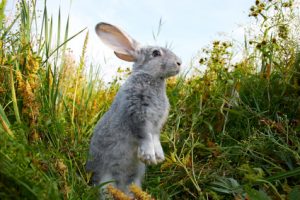Course Summary
- The Companion Animal Behaviour course focuses on the behaviour and psychology of dogs, cats and rabbits. The course is relevant for pet owners and those working in the dog, cat and rabbit care sector.
- Over the past 3 years, there has been a dramatic increase in the number of companion animals being abandoned and surrendered to re-homing organisations. A major factor for this problem behaviour; it is also the most cited reason for re-homing failures.
- Understanding how dogs, cats and rabbits think and learn is vital for anyone working with these 3 popular companion animals.

*You will have access to the course for 12 months only. You can purchase course extensions.
Unit 1
Dog Psychology and Behaviour
Learning the basics of dog psychology will help you to understand things from a dogs point of view.
This unit will give you an understanding of how dogs think and learn and also includes information about canine body language and behavioural signs of emotions.
The module includes information about the principles of behaviour and how body language is linked to canine behaviour and emotional state.
Unit 2
Feline Psychology and Behaviour
Learn how to identify the differences between learning and thinking in terms of feline psychology.
Explore the relationship to modern domesticated cats in terms of species specific behaviour.
Gain an understanding of the processes related to the nervous system and relevance to feline behaviour in terms of thinking and learning.
Learn how physiological systems contribute toward social learning, conditioning & response.
Explore the differences between learning & thinking.
This unit also explores the social history of the domesticated cat.
Unit 3
Rabbit Psychology and Behaviour
This unitexplores the natural behaviour of the rabbit and compares behavioural aspects of the wild and domestic rabbit with a view to welfare.
Rabbits are prey animals and hence much of their behaviour is directed toward self-preservation. The rabbit is a highly social animal and often live in large family groups within a burrow that consists of a network of tunnels and nesting/retreat hollows. In order to maintain normal behaviour and well being, all this needs to be given careful consideration when creating an environment in which companion rabbits are to be kept.
We offer a selection of accredited and employer recognised courses specifically designed for careers working with animals.
If you have any questions about our courses, please contact us.
We’ve assisted many people to achieve their goal to work with animals. Read more about our 5-star reviews and student success stories.
Gain relevant training to achieve your goal to work with animals.


